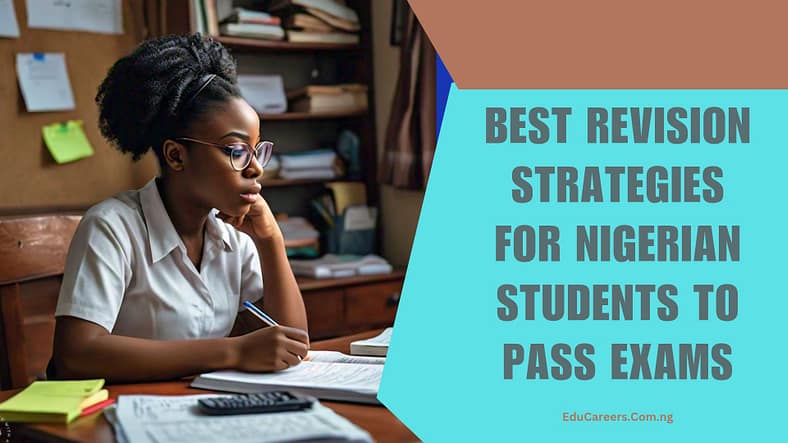Revision is a critical part of exam preparation, especially for Nigerian students facing pivotal exams like WAEC, NECO, and JAMB. Success requires more than last-minute cramming—it’s about developing smart, effective revision techniques tailored to your needs. This guide delves into diverse and innovative strategies to help you retain more information, manage your time effectively, and approach exams with confidence.
Why Effective Revision is Key
Revision isn’t just about rereading textbooks or copying notes. It’s about engaging actively with the material to:
- Improve retention and understanding.
- Identify knowledge gaps and areas requiring more attention.
- Boost confidence and reduce exam anxiety.
Let’s explore the most impactful and tailored techniques that will help you ace your exams.
Comprehensive Revision Techniques for Nigerian Students
1. Active Recall: Test Yourself Instead of Rereading
Active recall involves retrieving information from memory without looking at your notes. It’s a scientifically proven way to strengthen memory.
How to Apply Active Recall:
To Receive Latest Updates on: Scholarships, Internships, Recruitments and Job Opportunities Join our Telegram and WhatsApp Group Now!!
- After studying a topic, close your book and write down everything you remember.
- Answer questions from past exams or create your own quiz.
2. Spaced Repetition: Revisit Regularly Over Time
Instead of cramming everything at once, space out your revision over days or weeks. This technique reinforces memory through repeated exposure.
Tools to Use:
- Apps like Anki or Quizlet automate spaced repetition for flashcards.
- Schedule specific times to review topics weekly.
3. Teach Someone Else
Teaching is one of the best ways to solidify knowledge. Explaining concepts in your own words forces you to understand them better.
Who to Teach:
- Teach a friend, family member, or even a classmate.
- Pretend to give a lecture or record yourself explaining a topic.
4. Use Visual Aids Like Mind Maps and Charts
Visual learners benefit from creating diagrams, flowcharts, and mind maps. These tools help break complex information into manageable chunks.
Steps to Create a Mind Map:
- Write the main topic at the center of a page.
- Branch out with subtopics, adding key details and examples.
- Use colors, symbols, or images to make it engaging.
5. Create Summary Notes
Condense your class notes into brief, bullet-point summaries. Writing summaries helps filter out unnecessary details while focusing on key points.
Tips for Effective Summaries:
- Use headings, subheadings, and bullet points.
- Highlight or underline crucial information.
Collaborative and Interactive Techniques
6. Group Study Sessions
Studying with peers provides different perspectives and helps clarify doubts.
Benefits of Group Study:
- Share notes and resources.
- Take turns explaining concepts to one another.
7. Peer Quizzing
Test each other using custom-made quizzes. Turn learning into a fun, competitive activity.
Technology-Assisted Revision Techniques
8. Leverage Educational Apps and Online Resources
Numerous apps are designed to make learning more interactive and engaging.
Examples of Useful Apps:
- Khan Academy: For in-depth video lessons and quizzes.
- WAEC Past Questions App: Access to a large database of past WAEC questions.
- Forest App: For staying focused during revision.
9. Use Videos and Tutorials
Platforms like YouTube and educational websites offer free tutorials that simplify complex topics. Look for Nigerian-specific content tailored to WAEC, NECO, and JAMB.
Examples of Channels:
- NPowerNG Tutorials.
- Simplified Mathematics and Science.
Physical and Mental Preparation Techniques
10. Stay Active with Movement-Based Learning
Combine physical movement with studying to enhance memory retention.
Examples:
- Walk around the room while reciting notes.
- Use gestures to act out information.
11. Meditation and Relaxation Techniques
Reduce stress with mindfulness or breathing exercises. A calm mind absorbs information better.
Time Management for Smart Revision
12. The Pomodoro Technique
Break your study sessions into intervals:
- Study for 25 minutes, then take a 5-minute break.
- After four cycles, take a longer 15-30 minute break.
13. Prioritize Tasks Using the Eisenhower Matrix
Divide tasks into four categories:
- Urgent and Important: Revise weak subjects.
- Important but Not Urgent: Review familiar topics.
- Urgent but Not Important: Quick reviews before exams.
- Neither Urgent nor Important: Avoid distractions.
Additional Innovative Techniques
14. Record and Listen
Record yourself reading important notes or concepts, then listen during commutes or while resting.
15. Color Coding
Use colored markers to categorize information:
- Red for critical points.
- Green for examples.
- Blue for formulas.
Quick Revision Hacks Before Exams
- Night Before: Avoid cramming. Instead, skim through summary notes.
- Morning Of: Engage in light revision with flashcards or mind maps.
- Exam Hall: Quickly jot down any key formulas or mnemonics on scrap paper for reference.
Explore More on EduCareers.com.ng
- Best Study Tips to Pass WAEC, NECO, and JAMB with Success
- Top Strategies to Accelerate Learning and Improve Memory Retention
Conclusion
Revision is an art that requires consistency, creativity, and the right strategies. By combining techniques like active recall, spaced repetition, and teaching, alongside technology and proper time management, you can transform your exam preparation process. Remember, the journey to success lies not just in studying hard but in studying smart.






